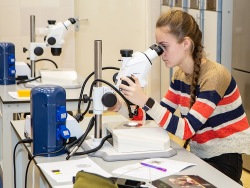A new project for high school pupils by the Primorsky Aquarium

The project called ‘Research and Project Ideas Lab’ seeks to assist school children and teachers in the new school year. The Primorsky Aquarium and its partners, among which there are some scientific institutions of the Far Eastern Branch of the Russian Academy of Sciences, museums, business companies, environmental and educational organizations, have jointly prepared 14 case studies with assignments from different fields.
“Research and project activities are now obligatory for high school pupils, and we are offering school children in grades 8 through 11 to perform this work based on scientific ideas, engineering solutions, the professional experience of scientists, businessmen, experts in wildlife conservation, education and culture from Primorye,” explained Alexander Petrunko, Lead Specialist at the Environment Education Service of the Primorsky Aquarium. “This is a new opportunity for school children to self-identify and gain an insight into careers in knowledge-intensive, high-tech and socially significant spheres. High school pupils are expected to use their creative abilities in such activities as conducting a research, drawing up a business plan and implementing a community project.”
The Primorsky Aquarium has developed two case studies. One of them is devoted to freshwater fishes of the Russian Far East: pupils are invited to find out if non-commercial species inhabiting local rivers and lakes can be kept as aquarium fish. The other case study aims to explore open-ocean fishes, including sharks.
“Within the 'Research and Project Ideas Lab’ the Primorsky Aquarium brings its partners together, fulfills instructional, counselling and expertise functions and acts as a connecting link between the organizations and school children,” said Olga Shevchenko, Head of the Environmental Education Service. “We are very experienced in working with children and know what a modern school needs and how to explain complex things in a simple way easily grasped by pupils. Following on from the results of the project, a collection of reports on methodology featuring the case studies and the best creative works will be published in February.”
Entries for the ‘Research and Project Ideas Lab’ will be accepted from school teams until September 25, after which the expert committee will select participants. From September 30 through December 15, the teams will be carrying out their projects and research under the supervision of subject matter experts. In January 2021, the project will conclude with a conference, during which the jury panel will determine the winning teams.